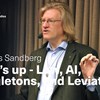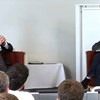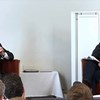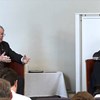swedberg
What is a social pattern? Rethinking a central social science term
Theory & Society Abstract The main aim of this article is to start a discussion of social pattern, a term that is commonly used in sociology but not specified or defined. The key question can be phrsociologicalconcept of social pattern may look like. A useful and theoretically solid concept of social pattern can in our view be constructed by basing it on Weber’s concept of social action. This means thatboththe behavior of the actorsandthe meaning these invest their behavior with must be taken into account. The article ends with a brief discussion of how to use the concept of social patterns in an effective way and what may endanger such a use.
Social Mechanisms: An Analytical Approach to Social Theory
1998. Cambridge University Press.

Anders Sandberg
My research focus on issues of the very long-term future, technologies that can change the human condition, low-probability high-impact risks, and how to reason about such uncertain domains. More spec
Interview with Nobel prize winner Thomas Schelling
In 2013 the Institute for Futures Studies arranged the 6th annual INAS-Conference in Stockholm. The conference was opened by Thomas Schelling, being interviewed by Richard Swedberg.

Globala katastrofer och existentiella risker. Intervju med Anders Sandberg
Kärnvapenkrig, pandemier, istider och robotar smartare än människan. Både naturen och vi själva kan försätta oss i situationer där mänskligt liv hotas på en större skala. Här intervjuas forskaren Ande
Ecocentrism and Biosphere Life Extension
Science and Engineering Ethics, 28. Abstract The biosphere represents the global sum of all ecosystems. According to a prominent view in environmental ethics, ecocentrism, these ecosystems matter for the

Anders Sandberg: Serf's up - Law, AI, Singletons and Leviathan
Research seminar with Anders Sandberg, Ph.D. in computational neuroscience, researcher at IFFS and Senior Research Fellow at the Future of Humanity Institute, Oxford University. Abstract A key problem

A conversation with Thomas Schelling part 3
www.iffs.se Thomas Schelling, an American economist and professor of foreign affairs who in 2005 was awarded the Nobel Memorial Prize in Economic Sciences for his analyses of game-theory, is interv

A conversation with Thomas Schelling part 2
www.iffs.se Thomas Schelling, an American economist and professor of foreign affairs who in 2005 was awarded the Nobel Memorial Prize in Economic Sciences for his analyses of game-theory, is interv

A conversation with Thomas Schelling part 1
www.iffs.se Thomas Schelling, an American economist and professor of foreign affairs who in 2005 was awarded the Nobel Memorial Prize in Economic Sciences for his analyses of game-theory, is interv








